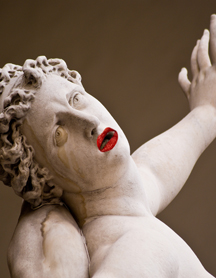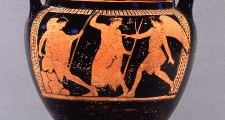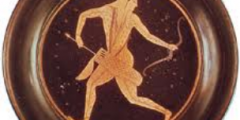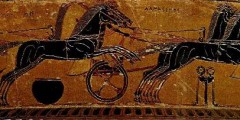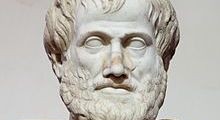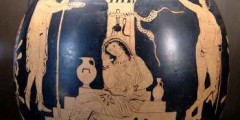Lunch with Lysistrata
March 14, 2013
Lakeside and The Nottingham New Theatre announce an exciting new adaptation of a classic Greek play, based on a translation from Aristophanes by Professor Alan Sommerstein and directed by Martin Berry, from 23 – 27 April 2013 at the Djanogly Theatre. Lysistrata is the result of a partnership combining the talents of the University’s highly …
Furies travelling light
March 6, 2013
One doesn’t normally think of ancient Greek women (at least if they were of respectable status), let alone goddesses, as showing more than half a leg in public, but here is a goddess doing just that – and what is more, if you believe Apollo (and Apollo, if you believe Apollo, never lies), she is …
In honour of a spiritual heir of Aristophanes
February 21, 2013
I don’t know whether the late Jim Henson, creator of the Muppets, ever sought inspiration directly in the comedies of Aristophanes, but there are certainly some ideas of his which might well have made the Greek poet’s ghost exclaim “Now why didn’t I think of that first?” One of these would certainly be the all-vegetable Singing …
The political wrestler
February 14, 2013
In the week when it has become probable that Rio de Janeiro in 2016 will see the last Olympic contests in wrestling, a sport that will have featured in 305 of the last 306 celebrations of the Games (275 ancient and 30 modern – it was omitted from the 1900 Paris programme), it seemed appropriate …
Lysistrata in Liberia
February 6, 2013
Her name is Leymah Gbowee, and she shared the Nobel Peace Prize in 2011 for (among other things) her role, as leader of a mass women’s movement, in bringing an end to the Liberian civil war in 2003. The tactics employed by the movement included at least three that are strongly reminiscent of Aristophanes’ Lysistrata: …
Multiple champion “killed” in racing tragedy
January 31, 2013
As this is National Storytelling Week, I thought I’d put up my favourite piece of storytelling from ancient drama – an early classic of sports reporting, from Sophocles’ Electra. The old slave-tutor of Prince Orestes of Argos has come to bring some very sad news to his master’s mother. “He went to the famous competitive …
Top philosopher’s favourite comic dramatist
January 24, 2013
Famously, in his Poetics, the philosopher Aristotle tried to define the nature and social function of tragic drama and what made a good tragic play. But what we know as the Poetics is actually only the first half of Aristotle’s treatise. The second half dealt with comedy, and a recent book by Walter Watson (The …
Comedy Jones? HMS Tragedy??
January 16, 2013
Would you call your son or daughter Comedy? At least two Greek parents did, more or less, in the fourth century BC. Inscriptions tell us of a sculptor working at Epidaurus, named Komoidion, and a woman in the perfume business at Delos named Komoidia. No one (that we know of) named their child Tragedy. But that …
The biggest mouth (2)
January 10, 2013
Last week, I asked: “In the 33 plays by (or attributed to) Aeschylus, Sophocles and Euripides that survive in full, which individual character has the most to say?” No calculation of this kind can be exact. Texts are often uncertain, lines are of different lengths and their attribution to speakers sometimes disputed, and so on. But …
The biggest mouth
January 3, 2013
Here’s a question for you to get your teeth into. In the 33 plays by (or attributed to) Aeschylus, Sophocles and Euripides that survive in full, which individual character has the most to say? This excludes generic character-designations like “Servant” and “Messenger”; and you’ll need to take care to distinguish between different characters of the same …

